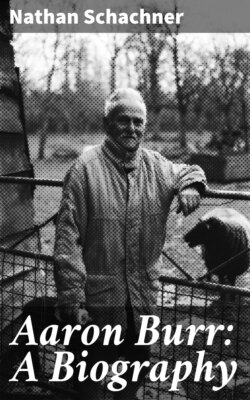Читать книгу Aaron Burr: A Biography - Nathan Schachner - Страница 11
На сайте Литреса книга снята с продажи.
3. Orphans
ОглавлениеTable of Contents
The young orphans remained under the kindly care of Dr. Shippen until 1761, when Timothy Edwards, their uncle and eldest brother of Esther Burr, assumed their guardianship. They were taken to Stockbridge, and in 1762 were removed with Timothy and his family to Elizabethtown, New Jersey.
The Reverend Timothy Edwards—he, too, was of the elect—was not exactly the proper person to rear his high-spirited young charge. He inherited the sternness and straitlaced morality of his great father without those other and more winning qualities that had made him adored by his children. The reverend gentleman believed in strict obedience, in the gloomy repressions of an ultra-Puritanic household, in the free use of the rod and long, preceding moral exhortations and castigations. Small wonder that the boy rebelled. He ran away on several occasions; once, at the age of ten, getting as far as New York, where he shipped as a cabin boy on a boat making ready for sea. He was discovered by his guardian in time and incontinently hauled home.[36]
But Timothy Edwards was an honest, if somewhat narrow-visioned, gentleman. He accounted strictly to the Burr estate for the funds deposited in his hands for the support of the two children, and he dealt with them fairly according to his lights. Nor did Burr harbor any resentment against him in after years.
They were given private tutors, and Aaron, at least, made rapid progress. Sally, though not quite as keen-witted, did well by herself in the process of achieving an education. One of their tutors was Tapping Reeve, who fell in love with his young pupil, and eventually married her. They went to Litchfield, Connecticut, to live, and Reeve was to become a great lawyer, the founder of the first law school in the Colonies, and ultimately to be elevated to the Supreme Court of the newly formed State as its Chief Justice. All their lives there was to exist a warm friendship between Aaron Burr and his erstwhile teacher.
There were diversions, of course. Sailing and swimming, hunting, riding and fishing with young Matthias Ogden, a year his elder, and brother-in-law to Timothy on his wife’s side. He, too, was a member of the Edwards’ menage. This friendship persisted also in later years, surviving the mutual hardships of the campaign against Quebec, and outlasting the more perilous difficulties of maturity. Aaron Burr had a faculty even in these tender years of attaching warm loyalties to himself.
He did very well in his studies. An uncle, Pierpont Edwards, himself only thirteen, wrote of his small nephew and school-fellow, aged seven. “Aaron Burr is here, is hearty, goes to school, and learns bravely.”[37]
So well had he learned that at the age of eleven he was positive that he was sufficiently prepared for college. Naturally there was only one place to be considered—Princeton. His whole family fortunes had been bound up in a peculiar degree with the existence of this institution for the breeding of Presbyterian ministers and incidental inculcation in the classical amenities.
He applied, and was refused—much to his disgust and mortification. Not because he was not qualified—the requirements for entrance were lamentably meager—but because of his extreme youth and tiny stature. “Little Burr” he was in youth and “little Burr ” he was to remain throughout life. He was a handsome youngster, with small, delicate features inherited from his father, and glowing black eyes that were never to lose their luster even when old and buffeted by fate and the malice of his fellow men.
He went back to Elizabethtown, determined not to be thus unceremoniously cast aside. For two more years he studied at home, following the curriculum of the College faithfully. At the ripe age of thirteen he knocked at the doors of Princeton once again; this time, however, demanding not merely admission, but entrance into the Junior class. For had he not successfully accomplished the required studies for the first two years?
His bold request was rejected, but, because of his special qualifications and his Presidential background, he was graciously permitted to enter—as a Sophomore. This was in 1769. Dr. Witherspoon was President, and the College was still officially known as the College of New-Jersey.
